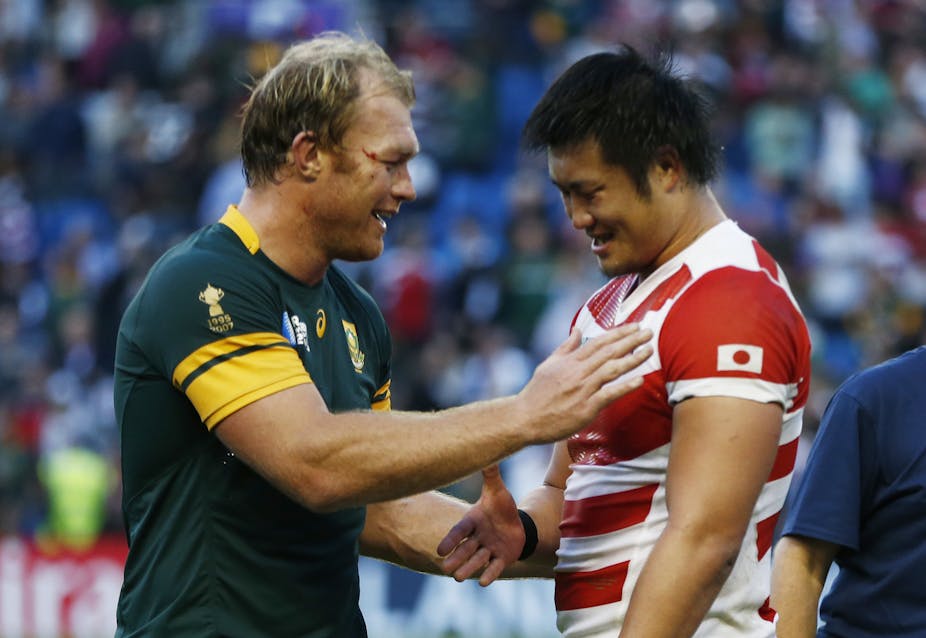The 2015 world cup has been gripping, exciting and filled with unexpected results. Rugby fever has spread further than ever and, at grassroots level, school physical education departments and local clubs are trying to seize the moment to inspire more young people to experience the game on the field as well as on the television and in the stadiums.
Teaching values through sport is not new to rugby. While many moan about the lack of fair play in football and actively strive to change the culture of the game both on and off the pitch, it can be argued that rugby has always been all about moulding behaviour – since the days of William Webb Ellis the game was used to train and discipline boys and prepare them for the army.
In 2009 the sport’s world governing body World Rugby (then the International Rugby Board) identified five core values as the “defining character-building characteristics of rugby”. These were integrity, passion, solidarity, discipline and respect. These core values have been embedded into training and coaching programmes in many unions across the world in an attempt to distinguish the game from others and to send a clear message about the character of the game.
Reporting on rugby often refers to these values. A lack of “discipline” is often being blamed for a team’s performance, and “respect” for the referee by the players is central to the game. It is not often that you hear of a world-class referee such as Nigel Owens telling off 30 men as if they were school boys for having a fight as he did in a violent game between Leinster and the Parc y Scarlets. The reaction from the players? They all apologised, referred to him as “sir” and didn’t answer back – you’d be hard pressed to imagine top footballers reacting the same way.
Value judgements
In 2007 the English RFU listed its core values as teamwork, respect, enjoyment, discipline and sportsmanship, while the Irish RFU lists respect, integrity, inclusivity, fun and excellence in its current strategic plan.
By contrast, national teams sometimes go one step further with an ethos. New Zealand’s All Blacks aim to link values together with the culture of its players and fans. Words such as “mateship”, “whanau” (family) are common.
New Zealand will keep top players out of the team if they don’t fit the mould. There is a focus on “legacy” (going one step further and leaving something behind), “humility” (no one is better than anyone else) and “filling the gap” (innovation and creativity). While you can argue that “solidarity”, “mateship” and “whanau” are different descriptions for “teamwork” or “fun” and “enjoyment” is the All Black’s interpretation of the core values the reason why New Zealand are so successful?
Learning respect
These are ideas the University of Brighton it hoping to explore with a new initiative – Rugby 4 Peace. The initiative uses a unique coaching methodology to teach values and life skills through a dedicated rugby curriculum that can be adapted and adopted by schools – and those using rugby in conflict resolution or development. This unique “values-based” methodology brings moral and social learning together with tactics and skills on the pitch. Originally designed by academics volunteering on Football 4 Peace International it has been moulded to deliver the same outcomes via the oval ball.
A pilot curriculum for schools and clubs has been developed and six schools attended a launch which comprised of a day of coaching and a small tournament, with pupils placed in mixed school and gender teams.
The idea is for values and life skills to be a constant aspect of a player’s experience. So a ten-year-old learns the necessity of respecting the opposition and taking responsibility to clean their boots after a game; a 14-year-old needs to learn to trust his or her teammate to be in position to receive a pass and to begin to develop a leadership role within the team – when to lead and when to stand back and follow. A 16-year-old, meanwhile, needs to realise the importance of being a positive a role model, both within the game as well as within his or her school, club or community.
The curriculum will be tested in schools and clubs in Sussex and with a capacity building programme in The Gambia. If this takes off as we expect, the hope is that Football 4 Peace will take another look at its own curriculum and take on what it has learned from the way Rugby 4 Peace has tackled values within rugby.

